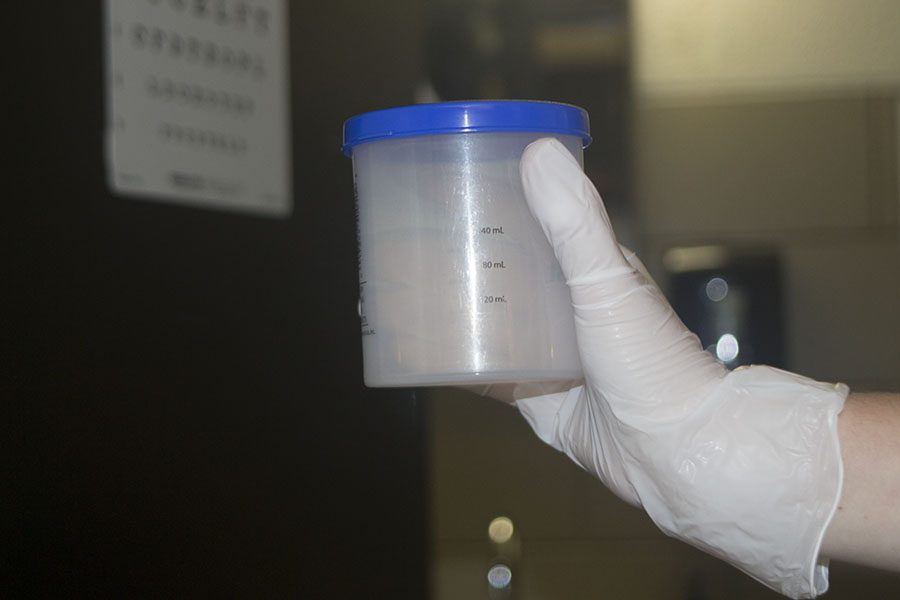Patriot Perspective: Lack of communication detracts from benefits of new policy
At the beginning of the year, the administration announced a new policy to randomly test students for drug use. Though well-intentioned, the development and introduction of the policy would have benefited with student involvement.
JC has developed a new policy that allows administrators to randomly drug test students in an attempt to reduce drug use. The administration needs to communicate all of the expectations and outcomes of this policy with students in a more timely fashion.
During orientation, students were informed about new policies for the academic year, including a new drug testing policy. As students raised their hands and asked questions, Vice Principal of Student Affairs and Technology Brian Powell could only touch on the basics of the drug testing policy. He could not go into great detail about the rehabilitation stage due to the fact that the policy was still in the works.
The development of the new drug testing policy lacked a strong conversation with student leaders and ultimately resulted in an incomplete policy that seems to have been rushed. If a policy is going to be enforced, then it should be fully developed and communicated to the students much sooner than a couple of weeks into school in order to be beneficial.
The administration must consult student leaders before implementing the policy so that together, they can develop a more coherent and understandable policy. Not only will this extend the conversation to those who will be affected, but it will also make students more willing to follow.
While the administration had made small steps in beginning a conversation with students through advisories, this is not enough when it pertains to a controversial topic such as the drug testing policy. We acknowledge the fact that an assembly is scheduled for next month to kick off the policy, but this delays the important conversation that should have happened during orientation, not two months into school.
It is crucial that communication between administrators and students occurs in a timely fashion, whether it be through a meeting between the administration and students leaders or a student-parent informational session at night so that an open discussion is established and allows for questions to be answered.
Unfortunately, the administration did not communicate this policy with the students in an appropriate manner. Administrators sent two emails to parents throughout the development process, one to address that a new policy is in the works and one to outline it. Students were not included in the email lists and were reliant on their parents informing them on a change that could affect them.
Students need to be made aware not only of the drug test, but especially of all outcomes and possibilities. A major area of concern is the drug rehabilitation students must undergo if found positive. Drug rehabilitation is not a simple step in a student’s life and could massively impact a student’s academic career due to the time commitment. It remains unclear what students can expect from it as well as how it will be done appropriately.
The administration mistakenly expects students to leisurely peruse the handbook in order to discover specific details on policy changes, but in reality, they don’t. When major changes such as a drug policy are brought about, a single email or a few lines in the student handbook does not act as a sufficient way to communicate and automatically limits the discussions by preventing instant dialogue about it.
Due to the minimal attention on such a major change, students have been left feeling angry and confused. Their confusion has led to a series of impromptu question sessions that have disrupted many class periods and oftentimes leave students with the wrong information.
Students were left uninformed about a policy that impacts their entire school year and did the thing teenagers do best: spread rumors. The most common and disturbing rumor so far has been that you would be watched while you gave your urine sample, which according to Powell, will not be the case.
The administration has not even discussed the drug policy with student leaders, which has damaged the previously effective and beneficial relationship between students and faculty. Last year, the Student Government Association met with members of the administration every Wednesday to discuss certain policies, such as academic integrity and late homework.
This year the groups have not been able to continue that relationship, which has affected how the student body receives information. Students rely heavily on student leaders to be able to answer any questions they have and to know why things happen at the school. Without those leaders involved in the conversation, they can not act as the voice of the student body and are unable to inform them on changes.
It is not too late to tweak the drug testing policy and improve the circumstances to produce the most productive results. In order to prevent further miscommunications about the drug testing policy, the administration needs to have a conversation quickly with the community to discuss the new policy and receive input on how it can be improved before students receive more information.
Rather than waiting for the assembly, the administration must meet with student leaders as soon as possible to discuss the expectations of the drug policy. This way the voice of the students will be heard and the policy can be altered in a positive way. It is evident by results from last year that when student leaders are brought into the conversation, it can benefit the outcome.
When it comes to future policies that affect students’ everyday lives, there should an informational assembly during advisories between upperclassmen and underclassmen sometime during the first week of school. While we acknowledge that it may take some additional effort on the part of the administration, they should also provide a visual aid such as a powerpoint during the assembly to assist in informing students who may understand things better when presented with visuals.
Oftentimes, students need a day or so to fully process information. As a result, administrators should hold an additional question and answer session the next day so that students can ask the administrators any questions they develop after processing the intricacies of the policy. This way students will receive accurate information from someone who will be enforcing the policy and will be able to ask any questions or voice their concerns.





